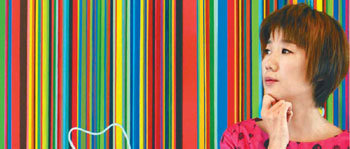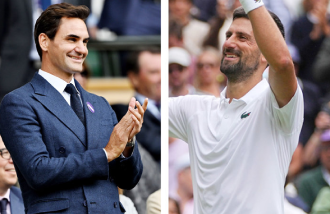Musics Healing Effects

Her music is like a melody that has lost its path. Everything is separated from reality by a palm-length. It focuses more on the soft orchestra of weed insects or the path to the heaven than on the waning emotion of love, and she sometimes sings of becoming a happy anarchist. But these flamboyant notes of music never wander around. Its because she is drawing a special orbit as one of the rare female artists in the history of Korean music with her unique melody.
Singer Lee Sang-eun (37) came back with her 13th album, The Third Place, ending two years of rest following her 12th album Romantopia in which she sang of love. She co-produced the album with Izumi Wada, the producer of her 6th album Gongmudohaga, which was well received by critics. She produced her new album in Okinawa where her workplace is.
Her music sounds more complete than before, and she says this album stands between Gongmudohaga, and her 12th album Romantopia which was easy to listen to and popular.
Though she says she has become a native of Hongdae after staying there for seven years, the interview has taken place at a gallery in Insa-dong, Seoul on October 5. Her first words were: Its strange to be in a new place.
Hongdae and Lee Sang-eun are linked now.
When I was in my 20s, I used to move between Japan and America. When I returned to Seoul I was 30. Im originally a native of Samcheong-dong, but Hongdae suits me more now. There are always new shops, and they are replaced by newer ones after a month. The dynamics of New York and the passion of Tokyo co-exist here. On weekends, I drop by the concerts of younger musicians. Some clubs have even made VIP tickets for me. Im almost the village chief for this place.
― What does the title of your new album mean?
When I stayed in Okinawa for a year, my daily schedule was watching the sky, watching the clouds pass by, watching the sea change its color, watching the sunset, and thinking about life. I looked into the chaos of Seoul in front of the wide-open sea, and I realized that I was very tired of my city life. I was surfing on the net and came across the expression that the first place is survival, the second place is production, and the third place is the revival of the nature of human beings that they are born with. I hope that my music has a healing effect.
―Compared to your last album which was about love, it seems that youve returned to your roots.
In the last album, in which I pursued popularity, the joy or sorrow I wanted to express was plain. After I told people of my boyfriend, they linked all my songs with that (Shes not dating anyone at the moment). Working with Izumi Wada gave me a chance to free myself from popular music. Hasnt it become much easier, though?
― What is the question you were asked most frequently over the 19 years of your life as a musician?
(Laugh) Before the Riverside Song Festival, a senior in my university wrote me five songs. While I was hesitating which should be mine, others took all the good ones. Only Damdadi was left. People laughed at me because it was sounded like it was half-written. I felt nervous and added dance to the music and changed the title to Damdadi (which no one noticed). I never imagined it would win the grand prize.
―Have you ever regretted starting your life as a musician with Damdadi?
I could have started it with a lot more ease and grace. But I strove to this place on my own and Im proud of it. It was the era of Sobangcha then. Starting with Damdadi was the best thing I could have done. It was good in its own way, I think.
―You seem to have such a unique mood of yourself and seem not to care about the popular reaction.
Thats what people call a swindler. Not caring about popular reaction means not being responsible. Last night I spent hours checking the chart for digital music and yelled Yes! after seeing some songs in the upper part of the chart. Achieving popular success with high-level music seems demanding, but I wouldnt miss it.
salthj@donga.com






![[단독]전직의원 속속 합류하는 대통령실…이영호·배진교도 비서관에](https://dimg.donga.com/c/138/175/90/1/wps/NEWS/IMAGE/2025/07/09/131967216.1.jpg)
